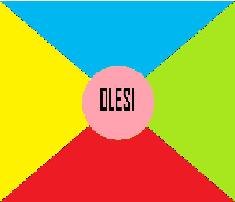Olesi
Olesi is a language that constructed by Selçuk Mert Köseoğlu who lives in Turkey and is 15 years old.Olesi is a priori conlang that isn't based on any natural languages.Many people think it's easy to learn.Selçuk Mert Köseoğlu announced that he is going to make a website that includes all the grammer rules, an Olesi lexicon and many useful phrases.
The Flag of Olesi
The flags colors' meanings:
Blue:Culture
Green:World
Yellow:People
Red:Languages
And they all come togeher in pink the color of Olesi.
Pronunciation
1.Alphabet
Wowels
A-a ...o in come
E-e ... e in met
I-i ... y in year(before/ after a wowel) ... i in in(after a constonant)
O-o ... o in on
é ... German ö
U-u ... German u
Å-å ... German ü
Note:é wowel cannot be written bigly.
Constonants
B-b .... b in beard
J-j ... j in judge
Ç-ç ... ch in choose
D-d ... d in daisy
F-f ... f in fear
G-g ... g in goofy
Q-q ... c in car
L-l ... l in lame
M-m ... m in main
N-n ... n in never
P-p ... p in part
R-r ... r in rare
S-s ... s in smooth
Ş-ş ... sh in she
T-t ... t in tear
W-w ... w in whale
Z-z ... z in zoey
2.Some Notes
Olesi is a language which is pronounced as how it is written.There are no diphtongs and no stress.
That's one of the reasons that Olesi is easy to learn.
Grammer
1.Kinds of Words
1.All nouns’ last letter is “e”.
2.All adjectives’ last letter is “a”.
3.For transforming adjectives into adverbs you have to add a “zu” at the beginning of the word.
4.There are no genders of the words.
5.The infinitive form of the verbs has the suffix "on"
6.All the pronouns', prepositions' last letter is "i".
2.Pronouns (Oåimez)
Zoi ... I
Çoi ... You
Qoi ... He/She/It
Loi ... We
Soi ... You
Joi ... They
Noi ... Someone
Foi ... Everybody
3.Cases
Accusative case
If we want to make nominative pronouns accusative, please add a “t” letter at the end of the word.
For example: Zoit=me
For words, use the ét word before the main word.
Zoi izaw ét maribez
I eat crabs
İzon=to eat
Dative case
If we want to make nominative pronouns accusative, please add a “p” letter at the end of the pronoun.
For example: Zoip=to me
For words, use “ép” word before the main word.
Joi bew ép pejane
They went to the cinema.
Bon=gitmek
Genitive case
Add a “me” to the beginning of the pronoun.
For example: mezoi = my
For other words, add a “’s” to the end of the word.
Johny’s panike
Johny’s cat
Ablative case
For all words, add a “må” before the main word.
Må Turkeno
From Turkey
Locative case
For all words, add a “il” before the main word.
Il Adana
In Adana
Instrumental case
For all words, add a “be” before the main word.
Be karre
By car
